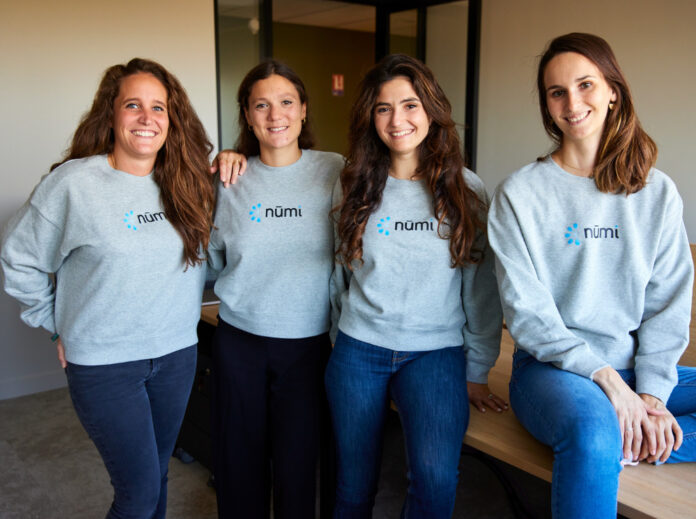4 Mins Read
Nūmi, a French startup making breast milk from cell-cultured mammary glands, has raised €3M in pre-seed funding to expand its R&D and recruit new scientists. It plans to file for regulatory approval in the US first, followed by Europe and Asia.
Founded in 2022 by duo Eugénie Pezé-Heidsieck and Eden Banon-Lagrange, Nūmi makes cultivated breast milk using mammary gland cell cultures, in a process it claims “strictly imitates the phenomenon already at work in women’s bodies”. The startup recreates the optimal environment for the development of mammary glands and feeds them with essential nutrients to produce breast milk for infants.
Its €3M pre-seed funding round included support from Heartcore Capital, HCVC, Financière Saint-James, Kima Ventures and Kost Capital. “We are passionate advocates for transformative innovation at the nexus of health and food manufacturing,” said Alexis Hossou, founder and managing partner of HCVC. “Nūmi stands as a prime example of this, with their technology poised to revolutionise accessibility to breastmilk for millions of women globally and advance human health in unprecedented ways.”
Pezé-Heidsieck, Nūmi’s chief technology officer, said the investment will enable the startup to “recruit the best talents for this ambitious project”. In addition to expanding its scientific team, the company aims to use the new funds to further its R&D capabilities and make progress toward regulatory approval and commercialisation.
Keeping its cultivated cards close to the chest
Nūmi, which was formerly called MUMilk, argues that current substitutes to breast milk – mainly based on cow’s milk – aren’t “nutritionally suited to the growth of infants”. Plus, many babies are intolerant to proteins found in dairy, which can further complicate things. The company says that breast milk’s unique composition means it can boost immunity, regulate metabolism, and aid in brain development.
About 5-10% of women are physiologically unable to breastfeed, but many more say they’re not producing enough or have nutritional deficiencies in their milk. In the US, less than half of women continue to exclusively breastfeed after three months, and only a quarter keep doing so at six months, which is the recommended period by the American Academy of Pediatrics.
In 2019, a study of 552 mothers found that about 70% experienced breastfeeding difficulties (mostly within the first month) like “cracked nipples, perception of insufficient amount of milk, pain and fatigue”. Many women also choose not to breastfeed, and Nūmi hopes to cater to all these mothers with its tech, providing them with a solution that is “as close as possible” to human breast milk.
According to the team, breast milk comprises over 1,500 constituents and Nūmi is looking to replicate as many of these as it can. While some alternative breast milk startups have initially focused on specific proteins – for example, Israel’s Wilk makes cell-cultured lactoferrin and Helaina produces a precision-fermented version of the same – Pezé-Heidsieck told Green Queen Nūmi is “working towards reproducing as many constituents of breast milk as possible, including different proteins”.
Pezé-Heidsieck declined to disclose specifics about which exact proteins the company is working on, the formulation or the composition of the rest of the milk, or whether the cultivated proteins would be complemented by plant-based ingredients. The company remains tight-lipped on a number of matters as it navigates a “key stage of development”. While Pezé-Heidsieck confirmed that Nūmi has developed different sourcing strategies to develop its cell lines, she didn’t go into detail here either.
Aiming for US regulatory approval before global expansion
Before it’s ready for infant use, Nūmi’s breast milk needs to be purified. “Dowstream processing to harvest and purity our cultivated breast milk is a key step of our R&D. We have developed different strategies to best purify breast milk and its constituents,” Pezé-Heidsieck revealed, but added: “It constitutes part of our intellectual property, and until we have filed our patents, we can’t share more information.”
CEO Banon-Lagrange said the team has “enthusiastic first results in our lab”, but can’t share a comparison with conventional breast milk at the moment. “Our goal using cell culture techniques is to bring as many high-value constituents of breast milk, accessible to all,” she added.
But one thing Nūmi was happy to talk about was its go-to-market plans. “The US is our first target market as they have developed a clear regulatory framework for innovations like ours,” said Banon-Lagrange. “We believe Europe will follow and would like to make our product accessible to European families as well as soon as possible.”
While the US will be the first country Nūmi will file for regulatory approval in, the CEO hinted at further expansion past North America and Europe: “We believe the Asian market will be an interesting opportunity for us.”
The idea is to become a trailblazer in this space across the globe. “The support of major investors in new technologies supports our ambition to become a leader in this sector,” noted Banon-Lagrange. “All families want to give their children the best: we want to help them achieve this, thanks to science.”
The post Nūmi: Cultivated Breast Milk Startup Raises €3M in Pre-Seed Funding, Plans for US Regulatory Approval appeared first on Green Queen.











